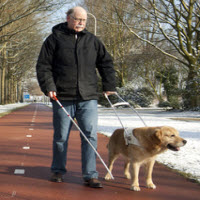Surprise! Not All Passengers With Disabilities Have Equal Rights
- Written by Roberto Castiglioni
 In this day and age access to aviation still comes with surprises, as not all passengers with disabilities have equal rights.
In this day and age access to aviation still comes with surprises, as not all passengers with disabilities have equal rights.
In a perfect world, respect for human rights is taken for granted; however, in remote areas of the world this is far from the case. The same legitimate expectation applies to access to aviation for people with disabilities; however, in this case there are even bigger surprises, often bordering outright discrimination.
Differences in legislation sanctioning the right to access to aviation contribute to create a divide between passengers. Let’s use the following example to best understand the issue.
Passenger A is visually impaired, and is traveling with his guide dog. Passenger B suffers from PTSD and regularly travels with an Emotional support animal.
Both passenger A and B travel with Lufthansa from New York to New Delhi via Frankfurt. However, they purchased separate tickets, as they have yet to decide how long they will spend in Germany.
Below, the requirements Lufthansa has for visually impaired passengers and passengers traveling with an emotional support animal from and to the United States.
Traveling with service/assistance animals
If you are bringing a service animal, we recommend that you contact us prior to traveling so that
we can make the necessary arrangements. Please be advised that, as a foreign air carrier, Lufthansa is only required to allow dogs on board as a service animal. If you cannot pre-book, any Lufthansa employee will be happy to assist you at the airport.
Emotional support and psychiatric service animals
Lufthansa also welcomes emotional support and psychiatric service dogs. We recommend that you contact us prior to travelling so that we can make the necessary arrangements. If you cannot pre-book, any Lufthansa employee will be happy to assist you at the airport.
Passengers A and B spend a week in Germany, and now decide to continue their journey to New Delhi. However, when they call Lufthansa they will find an unwelcome surprise, as the airline’s rules applying to all destinations other than the United States are far more restrictive.
Guide dogs and other assistance dogs
You have the option of taking a guide dog or other assistance dog with you free of charge. We recommend that you use a dog harness and muzzle. However, the number of animals allowed in the cabin is limited, so please let us know in good time if you wish to travel with a guide dog or assistance dog. Please also note that in some countries special regulations apply to the entry of animals and we recommend that you find out about the rules in advance.
It is also possible to transport a therapy or Emotional Support Animal (dog) free of charge in the cabin. You will require confirmation from your doctor that you require an assistance dog. Please note that the dog’s suitability for transport in the aircraft cabin may be checked.
As a result of these differences passenger A may not be able to travel to India because he did not pre notify the airline and must obtain required paperwork from the Indian embassy in Germany.
Passenger B may not be allowed to travel to India because he is missing his GP’s letter stating he requires an ESA animal to travel by air.
"LH is fully compliant with the rules and regulations of all countries in which it flies. On May
13, 2009, the U.S. Department of Transportation amended its Air Carrier Access Act (ACAA) rules (otherwise known as Part 382) to apply to foreign carriers as well as adding and updating provisions on various PRM topics including ESAN/SVAN," a spokesperson for Lufthansa told Reduced Mobility Rights. "Part 382 only applies to foreign carriers on flights to/from the U.S. They do not apply on Intra-European flights or flights to other countries, which are governed by Regulation (EC) No 1107/2006. Lufthansa amended its policies regarding the transportation of SVAN and ESAN on flights to/from the U.S. in order to be compliant with Part 382."
Compliance is the logical explanation. However, the airline, able to comply with U.S. legislation, applies stricter rules on all other routes. Lufthansa’s stance is the rule rather than the exception. The vast majority of airlines flying from and to the United States apply different, often stricter rules on passengers with disabilities traveling to destinations other than North America. Perhaps it is time to raise the issue with governments, or maybe the airline industry may decide to extend equal rights to all. One way or another, something must be done.
About the author
Founder and Editor-in-Chief of Reduced Mobility Rights, Roberto Castiglioni is an expert of airport accessibility, management and support procedures of passengers with special needs and air travel related regulations. He has been a frequent flyer for the past three decades and has several years of experience as travelling partner of a passenger who requires assistance.
Roberto provides accessibility and access consulting services to airports and airlines. He is a member of the UK Civil Aviation Authority Access To Air Travel Working Group. He is also a member of the Easyjet Special Assistance Advisory Group. Esaag provides Easyjet with strategic guidance and practical advice on the evolving needs of passengers requiring special assistance.










